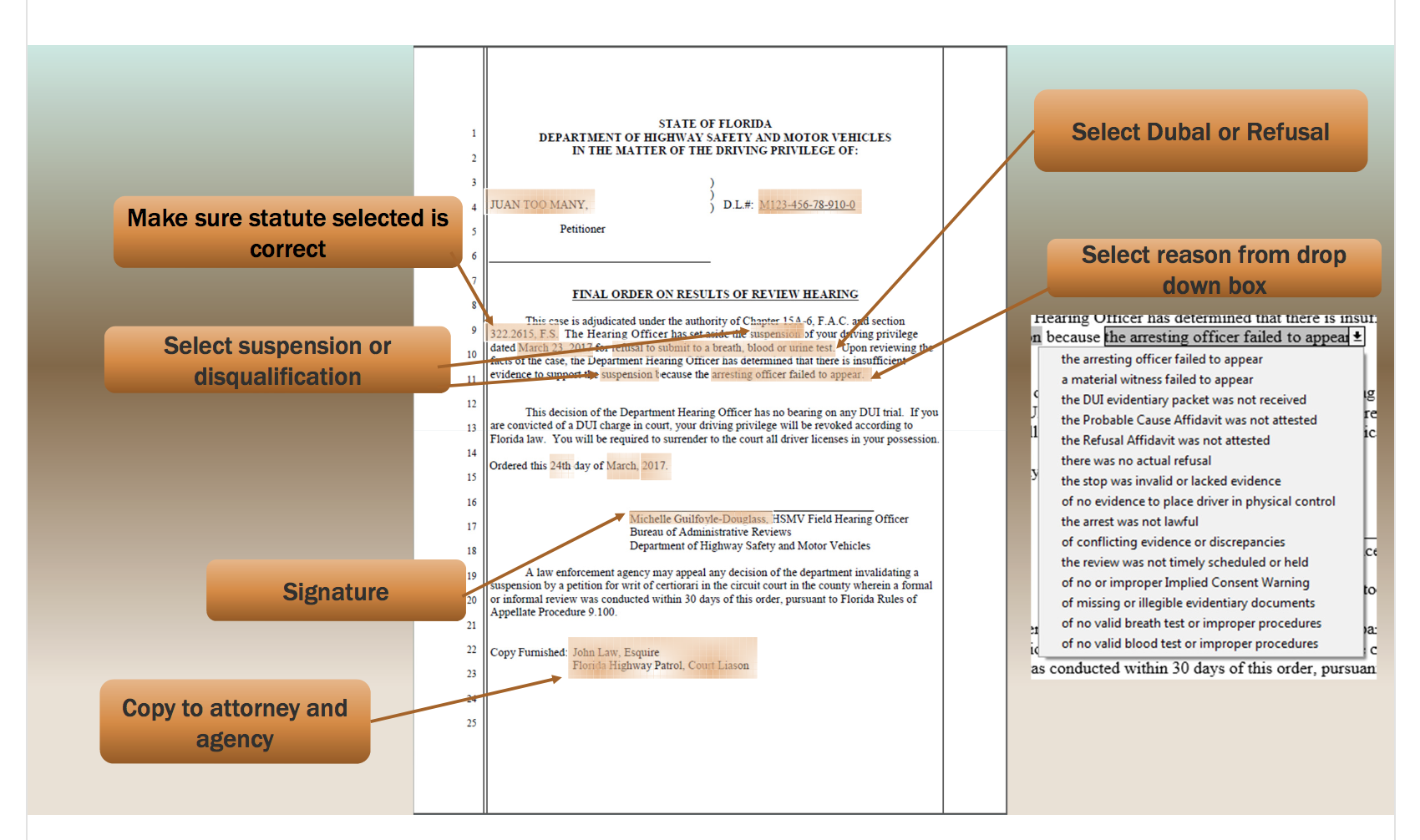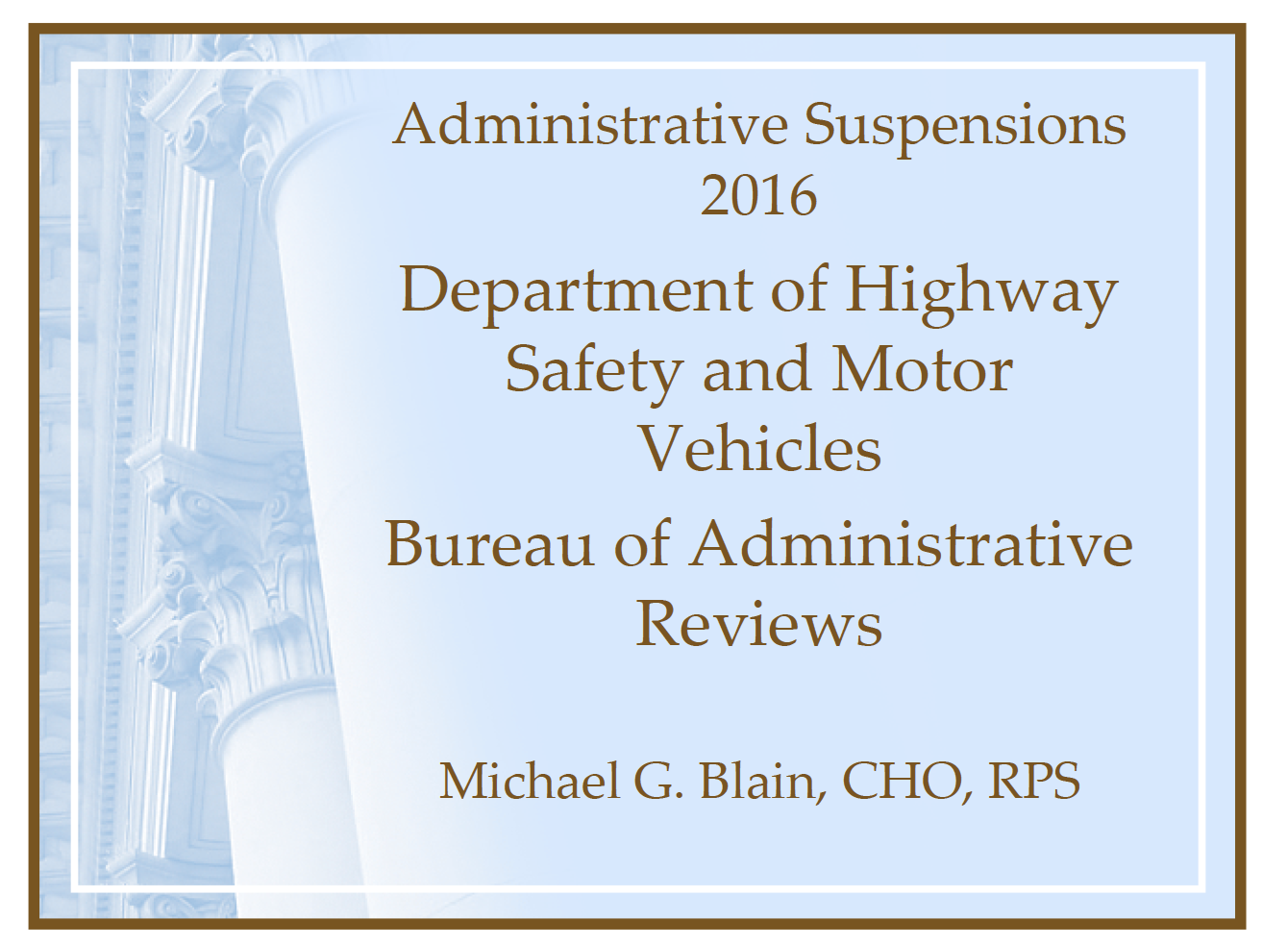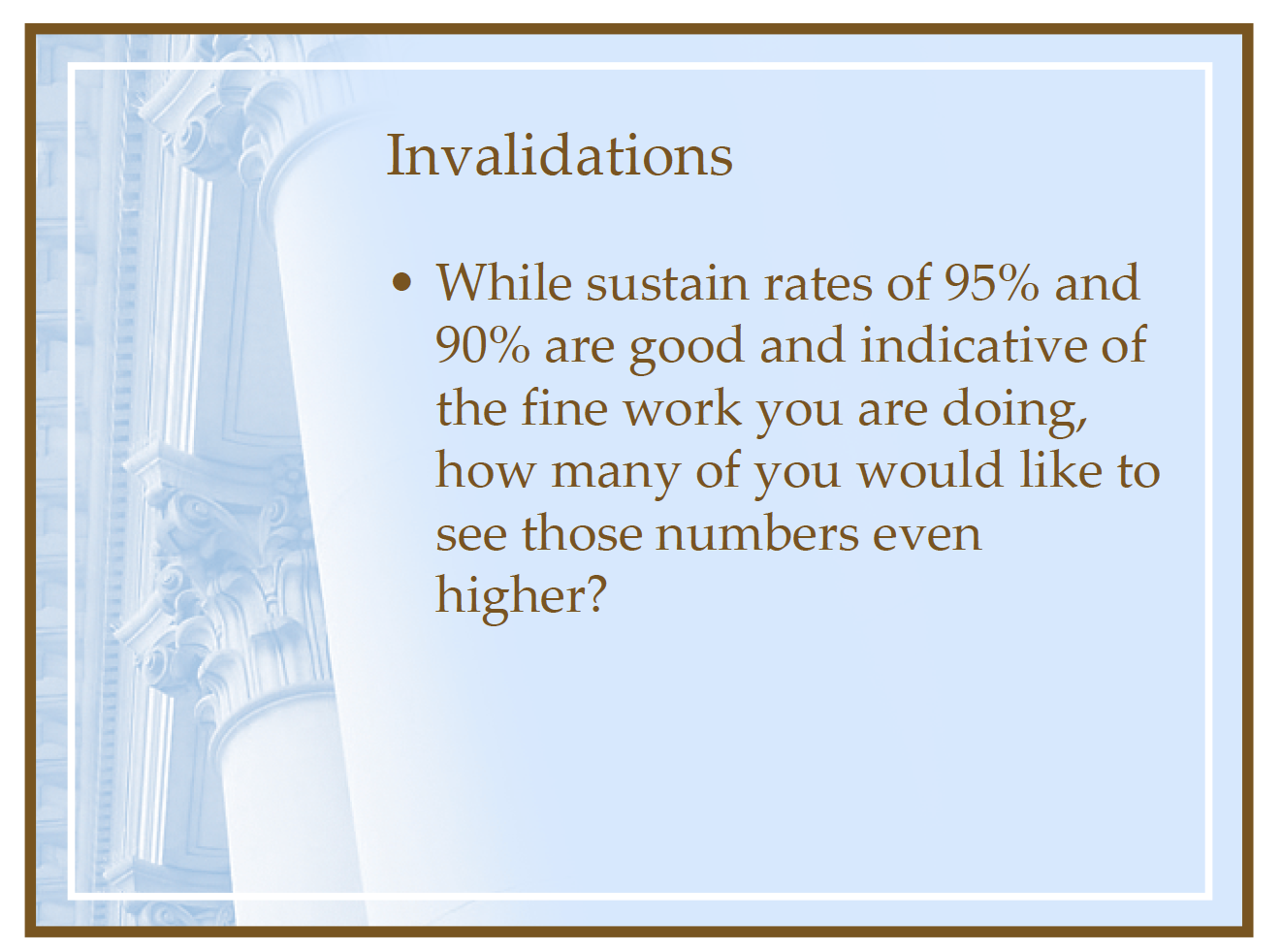Statistics on Administrative Suspensions in 2015

Recent statistics from the Bureau of Administrative Review Office shows that for all of the administrative suspensions invalidated in 2015, the hearing officers gave the following reasons listed in order by percentage:
- No .02 Agreement on the Intoxilyzer Breathalyzer Test -.05%
- No Probable Cause Under 21 – .17%
- Refusal Affidavit Not Attested To -.98%
- No or Improper Implied Consent Warnings – 4.4%
- The Driver Did Not Refuse – 4.4%
- Missing or Illegible Documents – 4.9%
- No Physical Control – 4.9%
- The Officer Didn’t Attest to the Probable Cause Statement – 5.5%
- No Valid Breath Test – 5.6%
- Conflicting Evidence – 6.3%
- Invalid Stop – 6.4%
- The Breath Test Operator Fails to Appear at the Formal Review Hearing – 7.9%
- No DUI Packet Received by the BAR before the Review Hearing – 10.8%
- The Arresting Officers Fails to Appear at the Formal Review Hearing – 32.7%
I ended up getting this information after reading an article in the FACDL’s Florida Defender Publication.
The article was about seminars being conducted by the DHSMV to train DUI enforcement officers on ways to avoid the invalidation of the administrative suspension. I wanted to know if these training sessions were occurring in Hillsborough County, FL.
For those of us who regularly attend these hearings – what could be better than reading the training material?
After making the public record request from the BAR in Tampa, I learned the local HSMV Field Supervisor conducted “The Administrative Suspension 2016” training at the HCSO Falkenburg Jail location on September 28, 2016.
More than 40 officers with the Hillsborough County Sheriff’s Office attended the training. Many of them were DUI enforcement officers.
The material promoting the “Administrative Suspension Training for Law Enforcement Officers” promised to cover the following topic:
- administrative suspensions under Florida Statute Section 322.2616
- administrative suspensions under Florida Statute Section 322.2616 (zero tolerance)
- probable cause affidavits
- refusals
- invalidations
- case law
The handout promoting the training promised to provide “statistics for your area and agency.” This handout indicates to me that the DHSMV keeps statistics for each area, agency, and hearing officer.
I’ve made another public record request to see the statistics they keep for the number or type of notice of suspension issued under 322.2615 and 322.1615 (hereinafter referred to as “administrative suspension”) for 2015.
I’d also like to see the statistics for the administrative suspensions for each area, agency and hearing officer including a breakdown of the reason for the invalidation. How many of those sustained suspensions involved a formal review hearing vs. an informal review hearing vs. a waiver review hearing?
It looks like the purpose of the training sessions is to help law enforcement officers, breath test operators, and agency inspectors avoid the most common reason for suspensions being invalidated.
In fact, the training materials even disclose a 95.3% sustain rate for administrative suspensions under Section 322.2615 (for adults requested to submit to testing) and a 90.3% percent rate for administrative suspensions under Section 322.2616 (related to individuals under age 21 years old).
Those numbers are really skewed because most of those people requested a hearing without an attorney or any plan to contest the suspension. For experienced DUI defense attorneys in Florida, the rate of getting an administrative suspension invalidated is much higher.
How the Training Material Can Help DUI Defense Attorneys
What can DUI defense attorneys learn from the training material? The material actually shows you what to look for and what arguments to make during the formal review hearing. The hearing officer is given a number of choices for their reason to invalidate.
It looks like they are receiving the same type of training as the officers – find a way to uphold the suspension so the sustain rate is even higher. Knowing those reasons used by the hearing officer and how frequently they occur is extremely informative for DUI defense attorneys.
If you have never done a formal review hearing before, this material is a MUST read because it contains the best issues to look for and the best arguments to make when you find those issues.
The Statistics on 2015 Administrative Suspensions – Sustained Rates
The statistics in 2015 show there were 34,449 administrative suspensions in 2015. That number seems a little high since other statistics show there were 31,783 DUI arrests in Florida in 2015 (see FDLE Annual 2015 Florida uniform crime report).
Out of those, 32,848 administrative suspensions were sustained. Therefore the percentage of sustained suspensions was 95.3%. These statistics are really misleading because most of these “sustained” suspensions were completely uncontested by an attorney.
In 2015, there were only 393 administrative suspensions under §322.2616 for drivers under the age of 21. Of those, 355 were sustained. That is a 90.3% suspension rate. Keep in mind that the vast majority of those suspensions went uncontested by an attorney.
In 2015, the DHSMV reported 468 administrative disqualifications under §322.64 for commercial drivers. Out of those, 438 disqualifications were sustained which equals a 93.5% rate of sustained suspensions. Most of those disqualifications were uncontested.
For my clients, I always recommend filing for a formal review hearing within the first 10 days of the arrest and contesting the suspension or disqualification.
The training materials then ask:
While sustain rates of 95% and 90% are good and indicative of the fine work you are doing, how many of you would like to see those numbers even higher?…. Let’s look at the reasons for those invalidations and what might be done to reduce the number that are invalidated.
Reasons Suspensions are Invalidated
The following “reasons for invalidation” are in descending order by percentage:
- The Arresting Officers Fails to Appear at the Formal Review Hearing
- The arresting officer not showing up to the formal review hearing is the main reason that the suspension is invalidated.
- In fact, 32.7% of the invalidations occurred for this reason.
- Additionally, if you combine the number of invalidations for the failure to appear of either the arresting officer or the breath test operator, that number jumps to 40.6%.
- The BAR suggested the following remedies for this problem:
- Show up
- Properly served subpoena – Designated departmental recipient (Court Liaison)
- Find the BAR email address and telephone number on a subpoena to request a continuance
- Understand the difference between the request for continuance vs. the failure to appear
- Requests to continue must be made prior to closing the hearing
- Just cause
- Not childcare, tired, or going fishing
- No DUI Packet
- The BAR not receiving the DUI packet in time accounts for 187 suspensions being invalidated which is 10.8%.
- To avoid this problem the BAR suggested to officers and their agencies:
- The agency should deliver the packet to the Department within 5 days following the issuance of the notice of suspension
- Deliver ASAP – See Florida Statute Section 322.26151
- The Breath Test Operator Fails to Appear at the Formal Review Hearing
- The breath test operator’s failure to appear accounted for 138 invalidations or 7.9%
- Skewed – only applies to DUBALS
- The DHSMV suggested the following ways to avoid a suspension for this reasons:
- Show up
- Properly served subpoena – Designated departmental recipient (Court Liaison)
- Do not list the breath test operator on the probable cause affidavit if they played no role in the case
- Use the BAR email address to request a continuance
- Invalid Stop
- An invalid stop accounted for 111 or 6.4% of the invalidated suspensions
- The DHSMV suggests the following ways to avoid that result:
- Ensure reason for stop by listing how you came into contact with the driver on the probable cause affidavit
- Explain the driving pattern, concern for well being, speeding….
- How determined Roberts case law
- Conflicting Evidence
- Conflicting evidence accounts for 109 of the suspensions or 6.3%
- Ways to avoid a suspension being invalidated for this reason include:
- Review documentation prior to testimony
- No Valid Breath Test
- Not having a valid breath test accounted for 97 or 5.6% of the invalidated suspensions
- The DMV suggested ways to avoid invalidating the suspension including:
- Comply with Rule 11D-8
- Two samples within fifteen minutes within a .02 tolerance
- 20 minute observation
- List who conducted the observation (entirely?)
- The Officer Didn’t Attest to the Probable Cause Statement
-
- The DMV suggests that the probable cause affidavit not being attested to accounted for 96 or 5.5% of the suspensions invalidated
- The DMV suggested the following ways to avoid the suspension being invalidated including:
- Ensure copies are made after attestation
- Ensure legible copies
- Ensure all sides are copied
- [[Note from the author – Always look at the criminal report affidavit or any other document being used to show probable cause to make sure it is actually attested to by a notary or signed by another officer that indicates that he or she personally knows the person making the report. I can’t tell you how many times we see this issue, especially when the arresting officer is a trooper with the Florida Highway Patrol. See Johnston, 553 So. 2d 730 (discussing the requirement for “strict compliance” with the affidavit requirement)]]
-
- No Physical Control
- The DMV statistics show that 86 or 4.9% suspensions were invalidated because of a lack of evidence of driving or actual physical control
- The DMV suggested was to avoid the suspension being invalidated for these reasons:
- How were they placed behind the wheel
- Fellow Officer Rule
- Supplemental reports
- Crash investigation/report
- Missing or Illegible Documents
- The DMV shows that 85 or 4.9% of the suspensions were invalidated because of missing or illegible documents:
- Ensure copies are legible
- Ensure both sides are copied
- The DMV shows that 85 or 4.9% of the suspensions were invalidated because of missing or illegible documents:
- Did Not Refuse
- The 2015 statistics show that 76 or 4.4% suspensions were invalidated because the subject did not refuse
- The DMV suggested the following ways to avoid a suspension on this basis:
- How was refusal determined?
- Stated?
- Manipulated the system/equipment
- “Could” not provide a sample
- Recanted Reasons For Invalidations
- How was refusal determined?
- No or Improper Implied Consent Warnings
- 76 of the invalidated suspensions of 4.4% were because of no implied consent warning or an improper implied consent warning
- The DMV suggested the following ways to avoid an invalidated suspension for this reason:
- Include the Implied Consent Warning in the packet
- Include the Refusal Affidavit
- Include the Disqualification Warning in the packet
- Refusal Affidavit Not Attested To
- The statistics show that 17 or .98% of the suspensions are invalidated because the refusal affidavit are not attested to
- The DMV suggested these ways to avoid that problem:
- Ensure copies are made after attestation
- Ensure legible copies
- Ensure all sides are copied
- No Probable Cause Under 21
- Three (3) of the suspensions or .17% of the suspensions were invalidated because no probable cause existed that the person was under 21
- The DMV suggested ways to avoid this type of suspension including:
- Scope for Section 322.2616
- Including probable cause about how the officer knew the person was under 21
- Ensure probable cause affidavit states how you knew
- Zero Tolerance Notice of Suspension includes checkbox
- No .02 Agreement on the Intoxilyzer Breathalyzer Test
- The statistics show that only 1 or .05% of the suspensions were invalidated because the breath test didn’t show a .02 agreement
- Ways to avoid this type of suspension included:
- Ensure reading is documented –If Intoxilizer is used Rule 11D-8 applies
Zero Tolerance Administrative Suspensions Under §322.2616
The training material asks: “Why so few? Let’s Compare and contrast 322.2615 with 322.2616.”
322.2615 Compared to 322.2616
- Both are administrative actions
- Both are roadside suspensions
- Both are DUBAL or Refusal – .08 and .02 respectively
- Both also allow for criminal charges
- Florida Statue 322.2616 only applies to under 21
- Florida Statue 322.2615 “Adult” applies to anyone
- Florida Statue 322.2616 may use PBT
- FDLE rules do not apply unless an Intoxilyzer is used
- Florida Statue 322.2615 requires an evidentiary device so FDLE rules do apply
Florida Statute 322.2615 Contrasted with 322.2616
- Florida Statue 322.2615 remains on the record for 75+ years
- Florida Statue 322.2616 remains until 21
- Florida Statue 322.2615 requires an arrest
- Florida Statue 322.2616 is not considered an arrest – the driver may be released to family
Driver’s Choices Within Ten Days of the Issuance of the Notice of Suspension
- Formal Review – Evidentiary
- Informal Review – Non-evidentiary
- Review Waiver
Probable Cause Affidavit
- What should be there:
- Place the driver behind the wheel
- Reasonable suspicion indicia provides probable cause
- What should not:
- Do not list the BTO if they played no role –possible subpoena/invalidation
Testimony at the Formal Review Hearing
- BTO needs to know their certification dates
- Agency Inspectors need to know their certification dates
- Hearing Officer determines if questions are within the scope
Case Law – Let’s take a look at some case law
- DHSMV vs. Brown, Respondent, 40 Fla. Law Weekly D2651 District Court of Appeal of Florida Third District [[explains why hearing officers are upholding suspensions when the affadavit is merely signed and not notarized – they are assuming that the signature is by another law enforcement officer who is authorized to administer oaths as explained in Gupton v. Dep’t of Highway Safety, 987 So. 2d 737, 738 (Fla. 5th DCA 2008) even though there is no way to know that from the four corners of the documents presented at the hearing).]]
- DHSMV vs. Luttrell, Respondent, 983 So.2d 1215 District Court of Appeal of Florida Fifth District
- DHSMV v. Fernandez, Respondent, 114 So.3d 266 District Court of Appeal of Florida Third District
- DHSMV vs. Wiggins, Respondent, 151 So.3d 457 District Court of Appeal of Florida First District
The Moral of the Story
The Florida Supreme Court has recently voiced concerns about due process and fairness at these administrative suspensions hearings, specifically when the hearing officer is deciding the suspension under Florida Statute Section 322.2615.
In fact, the courts have noted concerns about:
- whether drivers are being afforded reasonable notice and meaningful review of the lawfulness of the suspension;
- whether non-lawyers serving as hearing officers under section 322.2615 results in “constitutional infirmity”
- whether the hearing officer are really as impartial and neutral as the members of the judiciary are required to be; and
- whether the frequency with which conscientious trial judges in Florida issue decisions that have the effect of providing more procedural safeguards to licensees in these revocation hearings suggests a continuing concern about the fairness of this statutory procedure.
This training material shows that the Florida Legislature should start over. If the driver requests a formal or informal review hearing, then judges should preside over those hearings but under no circumstances should a hearing officer be allowed to do so.
These training materials show that the hearing officers and their supervisors at the Bureau of Administrative Review (BAR) office have no intention of being impartial and neutral.
The officers at the Hillsborough County Sheriff’s Office certainly know that after receiving this training.
Learn more about the 14 ways to win a formal review hearing to challenge a DUI administrative suspension.
Free Consultation
Submit this form to request a free and confidential consultation with one of our attorneys.
Our Office Locations
Tampa Office:
Sammis Law Firm, P.A.
1005 N. Marion St.
Tampa, FL 33602
(813) 250-0200
New Port Richey Office:
Sammis Law Firm, P.A.
7509 Little Rd.
New Port Richey, FL 34654
(727) 807-6392
Clearwater Office:
Sammis Law Firm, P.A.
14010 Roosevelt Blvd. #701
Clearwater, FL 33762
(727) 210-7004









4 comments
Comments are closed.